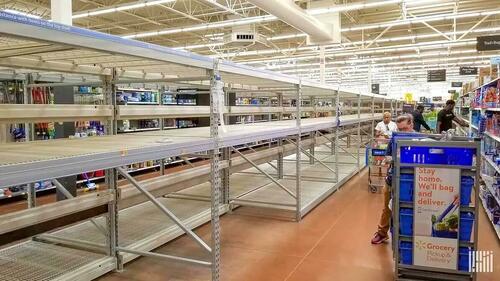Panic-Buying Already Spreading As Dockworker Strike Gets Underway
By Noi Mahoney of FreightWaves
As union dockworkers began striking against employers at East and Gulf Coast ports early Tuesday morning, reports of panic-buying at supermarkets almost immediately started spreading across social media.
Video clips posted by social media users on X and Facebook showed people rushing to buy water, toilet paper, paper towels and other items at supermarkets and retailers across the U.S.
“Are people already panic buying because of the Port Strike? Here are the grocery shelves in the water section at my local Kroger this morning. I realize that we are probably also low on water due to the Helene aftermath in East Tennessee, but still not great to see this already,” photographer and author Denise Van Patten posted in a social media video clip on X.
Are people already panic buying because of the Port Strike? Here are the grocery shelves in the water section at my local Kroger this morning. I realize that we are probably also low on water due to the Helene aftermath in East Tennessee, but still not great to see this already… pic.twitter.com/bxP0QgygnC
— Denise Van Patten (@DeeVP) October 1, 2024
Micheal Coker posted on X, “Well the panic buying is in full swing in my little town in South carolina. Sam’s at 8:30 a.m., no water. Same at Walmart and grocery stores. Next will be toilet paper.”
Well the panic buying is in full swing in my little town in South carolina. Sam’s at 830am no water. Same at walmart and grocery stores. Next will be TP. Get yours before it’s sears catalog for everyone
— Michael Coker (@michaelcoker59) October 1, 2024
The International Longshoremen’s Association (ILA) is the union behind the strike against its United States Maritime Alliance (USMX) employers for a new master contract. The two groups negotiated back and forth up until late Monday night, when the union’s deadline for a strike expired at midnight.
Major issues on the bargaining table are wages, benefits and rules on port automation. The ILA said USMX’s latest reported wage increase proposal of 50% over six years of a new contract was rejected by its members.
The affected ports, represented by USMX, include three of the U.S.’s five busiest ports: the Port of New York and New Jersey, the Port of Savannah, Georgia, and Port Houston.
Matthew Shay, president and CEO of the National Retail Federation, called on the Biden administration Tuesday to step in and help end the strike.
“A disruption of this scale during this pivotal moment in our nation’s economic recovery will have devastating consequences for American workers, their families and local communities,” Shay said in a news release. “After more than two years of runaway inflationary pressures and in the midst of recovery from Hurricane Helene, this strike will result in further hardship for American families.”
Shay urged the administration to prioritize the economy “and intervene immediately to prevent further hardship and deeper economic consequences.”
A prolonged strike could cause major disruption to the domestic supply chain, according to American Farm Bureau Federation Economist Daniel Munch.
“For international destinations, waterborne exports are vital to us farmers,” Munch said in a podcast on Thursday. “They make up over 75% of total U.S. agricultural export volume. The potential strike that we’re looking at would mainly disrupt containerized agricultural exports, which account for 30% of U.S. waterborne agriculture exports by volume. The remaining 70%, often grains and oil seeds, are shipped via bulk carriers, which are usually managed by independent workforces and will not be affected by the strike.”
He said U.S. farmers could be particularly vulnerable to a strike that lasts a week or more.
“The strike could have disastrous impacts on U.S. agriculture, depending on how long it lasts,” Munch said. “The disruption to overall agricultural trade is expected to be about $1.4 billion each week that a strike is in place. When we think about what commodities are at risk, nearly 80% of waterborne exports of poultry leave East Coast ports, 56% of raw cotton, 36% of red meat, 30% of dairy products and even 6% of soybeans all go through those ports, through containerized exports. Not having an outlet to move those goods will create supply surpluses domestically and reduce prices for farmers.”
The top retailers that could be affected by the work stoppage at the ports are Walmart, Ikea, Samsung and Home Depot, according to data from ImportGenius and Arbor Data Science.
Last year, Walmart led all U.S. retailers with the most imports to East and Gulf Coast ports. Officials for Walmart said they prepare for any potential disruptions to their supply chain.
“We prepare for unforeseen disruptions in our supply chain and maintain additional sources of supply to ensure we have key products available for our customers when and how they want them,” Jeffrey Essary, a global communications spokesperson for Walmart, told FreightWaves.
Tyler Durden
Wed, 10/02/2024 – 12:05

